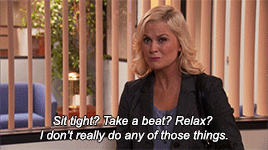
Today’s Buzz is by Meredith Reynolds, Park Planning & Partnerships Manager for the City of Long Beach. Follow Meredith on Twitter, LinkedIn, and Instagram.
What I’m Listening To: The new vinyl record my husband gets me each year for my birthday, this year is Chris Stapleton’s Traveller
What I’m Watching: The Wire
What I’m Planning: Long Beach’s National Day of Supper Clubbing (March 5th y’all!) and how to avoid eating ALL the girl scout cookies (the struggle is real)
January is always a good month because it is the start of a new year, and for me, it also happens to be my birthday! I always take time off for my birthday – because nothing good ever happens when I work on my birthday – and when I returned this year I was overwhelmed with what awaited me.
After a December retirement of a long-tenured staff lead, I had two new staff members start in December. While this doesn’t address the unfilled vacancies in my work unit, they are a welcome addition but were still in training, climbing their learning curve. I did not have the institutional knowledge I relied on from my retired staff lead and as a result, I had hundreds of emails awaiting MY response, as seemingly only I had the background and history and could provide input, share information or make decisions. Additionally, this month marked the start of two big regional initiatives and several high profile park capital projects that we had to figure out how to add to my team’s workload. My team and I also faced a major transition, as my Director announced his retirement and was to leave by the end of January and there was also uncertainty without the announcement of an interim Director. Did I also mention that my City is in the midst of a search for a new City Manager? It seemed like no sooner did the clock strike 12:01 on January 1st, 2020 has been off to a feverish pace.
Fast forward to February, where I have lost count of how many nights I’ve stayed late at the office or City Council meetings, the number of after-hours texts and emails that expect an urgent response, and the to-do list that gets longer before it gets shorter. I was also getting certain extra assignments because “I could be trusted to deliver and do a good job”, “I need you to attend in my place because I have to pick up my kids” or “someone else said this was yours to handle”. There is a lot to unpack in each of these statements, but they all speak to fundamental organizational issues that I have a hard time ignoring. I mean, I’m all for being a go-to person, but shouldn’t others be capable of doing a good job or trusted to deliver? Shouldn’t my time outside of the office be just as valuable as those who have other obligations? Shouldn’t my colleague be held accountable for punting their assignment to me without it appearing like I’m not willing to be a team player? These types of issues – without the proper time, attention, or a safe space to discuss them honestly – frustrate me and I found myself responding to things uncharacteristically. The words “not my job” and “can’t” actually came out of my mouth.
I found myself wondering how a 40 hours work week and reasonable expectations that match resources suddenly became such radical ideas and realized that I was squarely in the midst of a culture of overwork.

In many work environments, overwork can seem pretty harmless – we govies certainly understand the periods of hustle that can come with building a career and the value of just digging in and getting work done that benefits our communities. There will surely be moments on the job when you push yourself well beyond your limits. But this can quickly blur the lines where it becomes easy to forget what it’s like to not feel overwhelmed. Conforming to our overwork culture can feel like a survivalist necessity. You may get to a point at which you are mentally fatigued, frustrated, and disillusioned by your work situation. Even worse, you may be so overworked that you notice the manifestation of physical symptoms.

The perplexing thing that has been known for quite a while is that long hours and overwork diminish both productivity and quality. Featured in this Harvard Business Review article, the story of overwork is literally a story of diminishing returns:
keep overworking, and you’ll progressively work more stupidly on tasks that are increasingly meaningless.
Multiple studies have even revealed that overwork results in alarming physiological effects, including stress, high blood pressure, heart disease (at nearly twice the normal rate), depression, a vanishing libido, and insomnia. It can put a wedge in family life and impact our relationships and socialization skills. Not only can a live-to-work culture lead to employee burnout, but studies show that this kind of achievement-ism can also lead to an increase in cut corners and broken rules, which can have significant ethical and legal consequences for a government agency. The result of all of this overwork is overwhelmingly conclusive: it’s killing us and makes us crazy.

We may talk big about how we want to achieve the ever-elusive balance of work and life outside of work, but what do we actually do about it? Do we have the courage to approach overwork with the kind of urgency that we use to tackle the issues we attempt to solve at work? Here are some strategies you can immediately institute for yourself and discuss and incorporate as leaders in your organization.
- Identify work habits that perpetuate a live-to-work culture. Habits are powerful impulses to resist, particularly when overwork exists because that’s how it’s always been done because that’s the way I was trained by those in charge who were also trained that way. Establish a policy or practice for not sending emails after hours, or at least communicating that staff are not expected to respond to emails after hours.
- Avoid the trap of today’s messaging about living for work. Phrases such as “rise and grind” or “hustle” can easily perpetuate creating workers focused on work as a central driver of life. Sure, people need a paycheck, or may even be drawn to the outcomes and impacts of our government work, but attempt to see these messages for what they are, encouragement and not a way of life.
- Stop talking about how busy you are. Let’s agree to break the cycle where busy-ness is a badge of honor. Responses like “I’m slammed.” “I’m so busy” should be stricken from our vocabulary because they feed the culture of overwork.
- Re-evaluate your daily schedule. How many hours a day at work are you actually being productive? Identify any distractions that may be decreasing your work productivity and causing you to stay at the office longer than necessary. You’d be surprised how these distractions are likely consuming a good portion of your day and leading you to be inefficient and contributing to your high-stress level.
- Pinpoint overwork stressors. Sometimes it’s not only the long work hours that are stress-inducing but also the dynamic of the office culture may be equally distressing. If you are a part of a cut-throat work environment, or perhaps are dealing with workplace bullying or harassment, these are certainly major stressors that can cause emotional anguish and must be addressed immediately.
- Create a space to collectively discuss assignments, expectations and the ability to safely communicate when work is too much. These discussions about staffing and resources can drive innovation to determine what you should no longer be doing, how you can pivot your work efforts, or what can be reprioritized to accomplish new work.
- Take 5-10-minute breaks to help ease your mind when your stress levels at work begin to surge. Break time is a must and you should use those brief moments of time to do something for yourself to help you unwind, such as meditation or listening to relaxing music. Schedule this time for yourself and make this a healthy habit.
- Don’t take your work home. Leave your work in the office and never allow it to follow you home, which can be difficult with today’s technology that creates an expectation of constant connectivity, responsiveness and instant gratification.
- Exercise may be the last thing on your mind, but, it is actually a major stress reliever. Find ways to incorporate exercise into your daily work routine like light stretches desk side or take the stairs as often as possible to remain active and reduce your stress and anxiety levels. Also, strive to get an adequate amount of sleep.
- Don’t bottle up your frustration of being overworked. Find a confidant and speak to them about what you are feeling, and discuss possible solutions and mechanisms to cope with work-related stress. Incorporate services for healthy work habits and stress management in your employee assistance program and encourage employees to use this service.
Standing up and combating a culture of overwork is never easy, but remember that there is no job in this world that is worth compromising your health. Successful leadership teams understand the value of a healthy culture and that chronic, obsessive overwork has major consequences. Successful leaders model behavior for their employees so that the career ladder is not an endurance test to see who can struggle through punishing work, but instead reward high performance within reasonable parameters of work. You all may have other successful strategies for defying the culture of overwork, which I hope you share with the @ELGL universe. It could help someone have perspective and remember what about our work is important, changing individual habits and shifting organizational culture.

